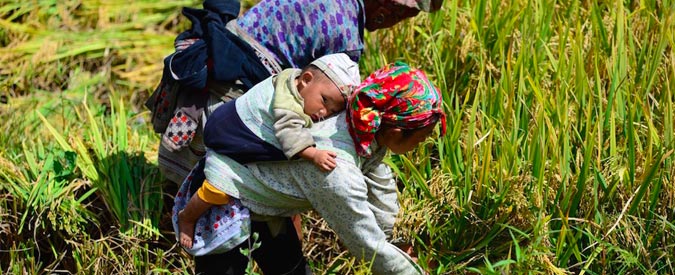
Gender and climate change: what do women have to do with this issue?
Although at first sight it may appear as a mere contrivance, the question immediately acquires a clearer and more precise outline if the concept proposed is considered with respect to developing countries, where women not only represent 43% of the agricultural workforce (with data ranging between 50% and 70% in sub-Saharan countries) but, for socio-cultural reasons are the members of their communities delegated to the preparation of daily food.
From the procurement of food to its transformation women rely on natural resources available to them and this has obvious implications for the environment, from deforestation to air pollution. We should also consider that such activities and routines are carried out by millions or, rather, billions of individuals.
However, this is only the first step in an analysis concerning the many activities which, in the least developed countries, are the exclusive task of women. The responsibilities of women range from the preparation of food to the education of children. It is women who are mainly involved in agricultural work and subsistence-level livestock breeding, cultivating small plots of land close to villages. It is women who use locally available water resources and manage the various uses of water in the home, from those relating to the preparation of food to hygiene. Of course, mothers take care of children but their commitment goes far beyond the simple concept of survival. As educators, mothers may be seen as key agents of change as they convey and communicate elements of progress; to introduce a woman to the concept of a better approach to natural resources implies the initiation of a virtuous cycle of transmission of knowledge.
Women are a very important factor in social stability as they manage and supervise most of the aspects of day-to-day living despite various socio-cultural obstacles they have to contend with. In many societies law or tradition does not allow women to own or inherit land and when they are granted access to it, only small plots of land of poor quality are reserved for them. They are often excluded from education or their participation in scholastic activities is discouraged as it is considered secondary with respect to the social roles of wives and mothers ascribed to them by society.
Although they represent almost half of the workforce involved in food-production processes, their role is not recognized and their access to credit and technological support is restricted if not rendered impossible. By valorising the productive capacity of women with a view to attaining a level of sustainable agriculture, we would not only be working for the environmental future of the planet. We would be moving towards a situation where women would be able to make full use of their individual rights, opposing poverty and malnutrition. Moreover, when they become involved in decision-making processes relating to climate issues, it has been seen that women do make a difference. Thanks to their knowledge and experience in the management of natural resources they are able to propose a viable response to environmental disasters with respect to both the safeguarding of the population and post-disaster reconstruction and the identification of new, immediately-required resources.
The recognition of these dynamics has led the United Nations to initiate a specific reflection on Gender and Climate Change within the UNFCCC (United Nations Framework Convention on Climate Change) and, that is, on the role that women may have in adapting to ongoing climate change and in the mitigation of such phenomena with a medium/long-term perspective. With the creation in July 2011 of ‘UN Women’, the UN organization dedicated to gender equality, the aim of the United Nations is to promote and support the incorporation of a gender perspective in policies and national action plans on sustainable development and climate change.
The outcome of the international debate is a broad spectrum of actions. These range from the involvement of women in decision-making processes which may affect the climate at the local and global level to the financial and the technological promotion of business initiatives for women (from agriculture to craftwork). Starting at the basic level of families, such initiatives would be capable of promoting social stability and, consequently, also environmental quality.
The whole discourse thus forms part of the broader issue of women’s empowerment. It is worth noting that an alteration of the latter term is not envisaged; it has been adopted “as-is” in international parlance. Its implications are thus enhanced, and the scope of the debate is extended, progressing from the sphere of human rights to the even broader debate on global environmental protection.
Chiara Soletti
Published for Italian Climate Network on the association’s website and on Science on the NET.
